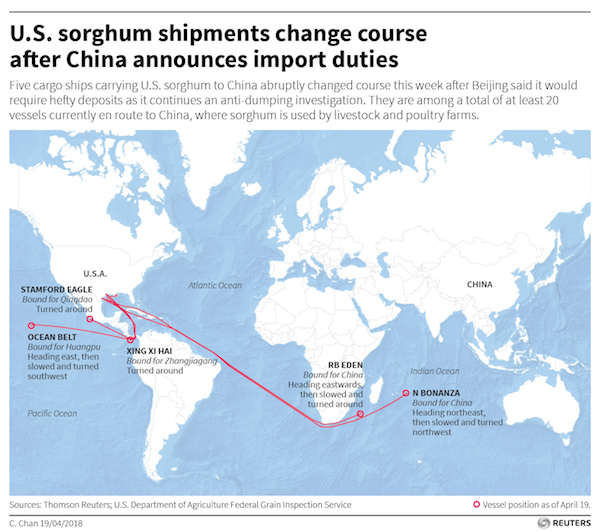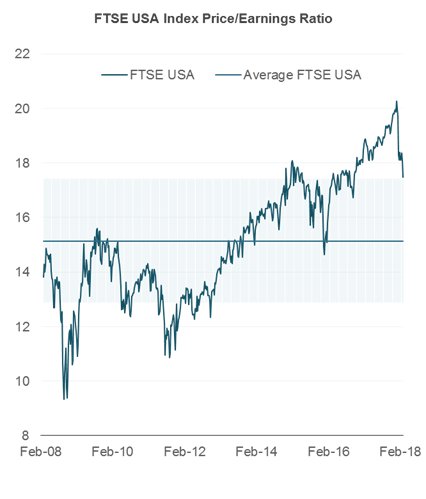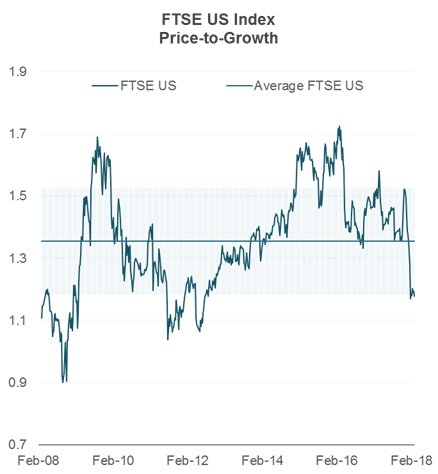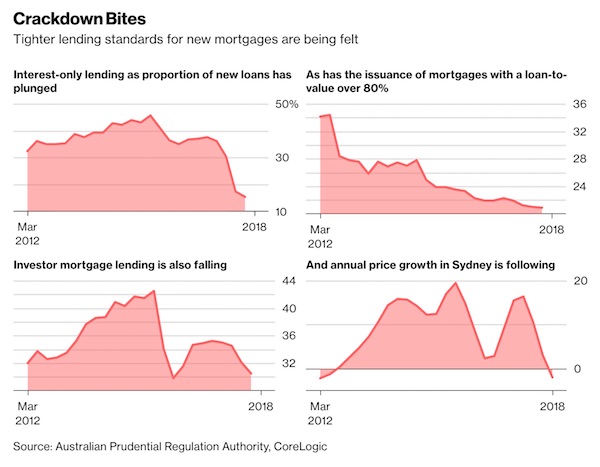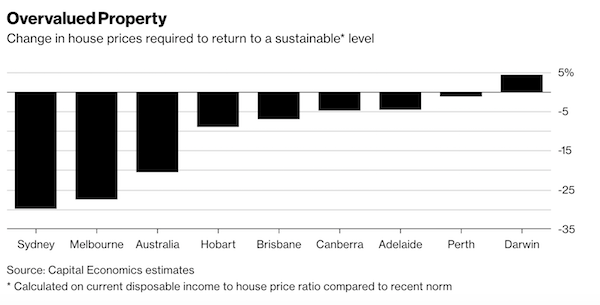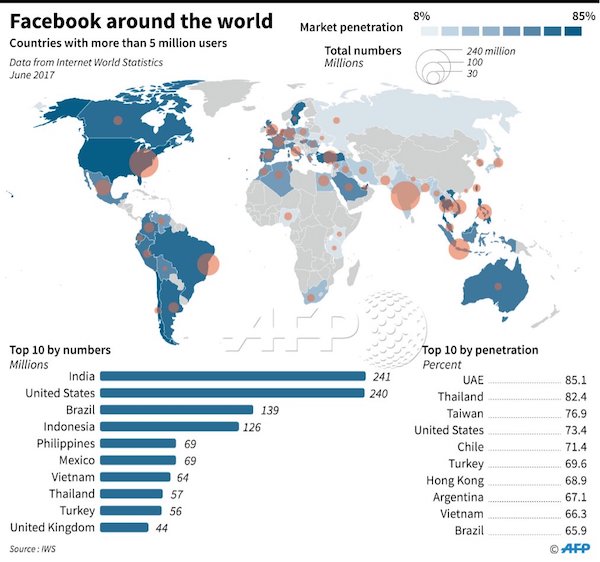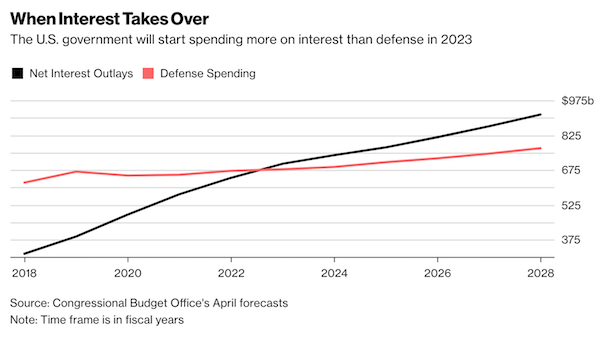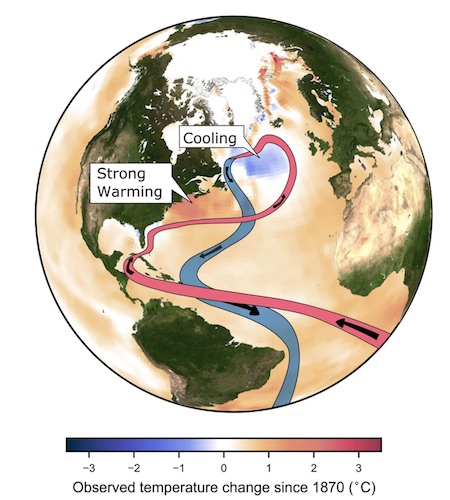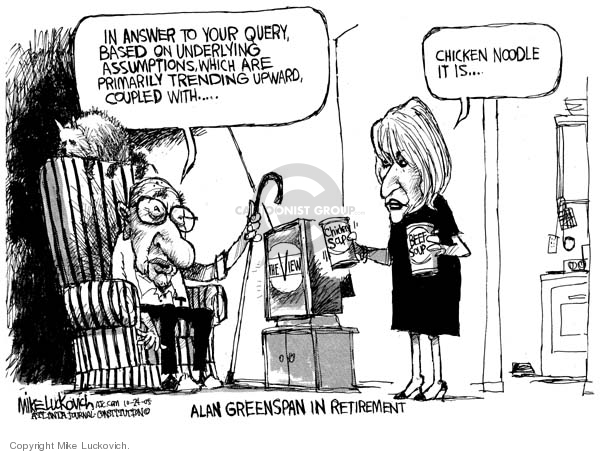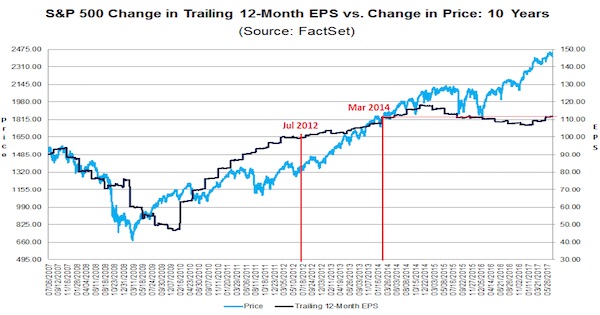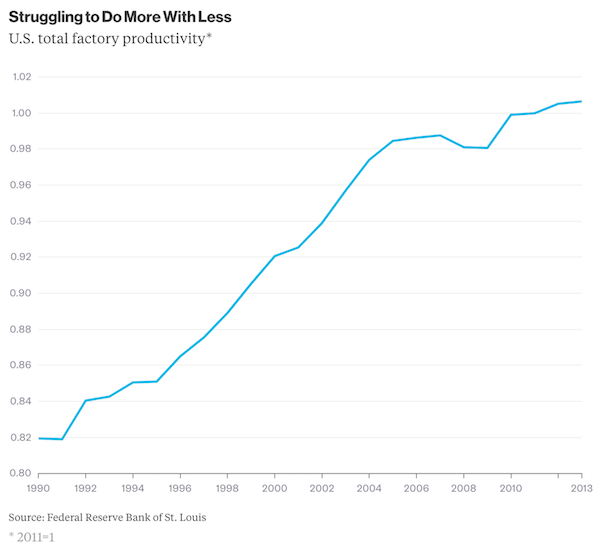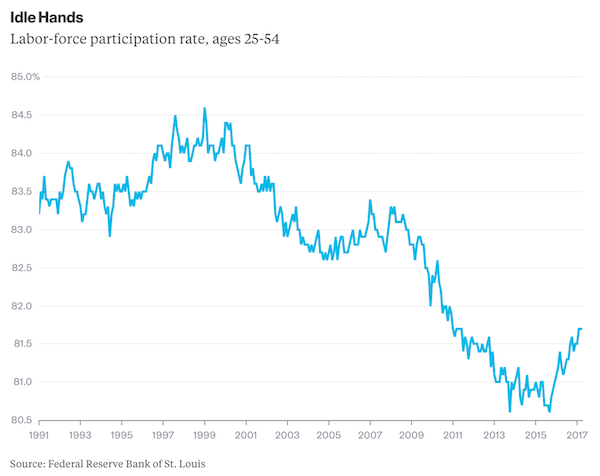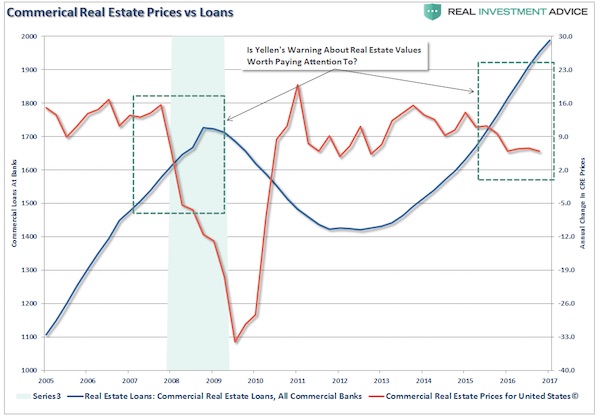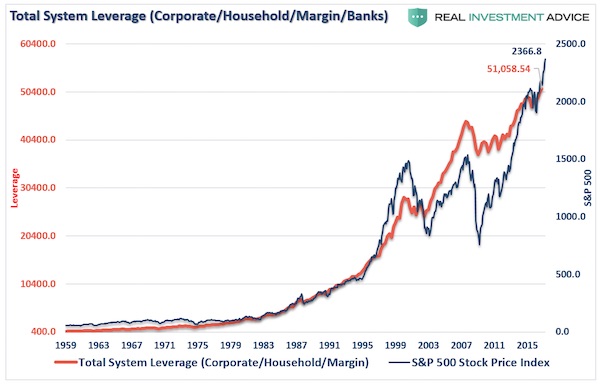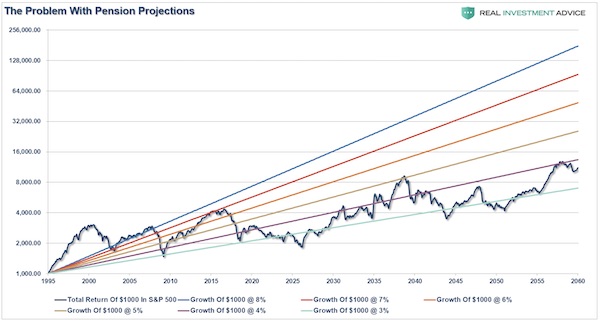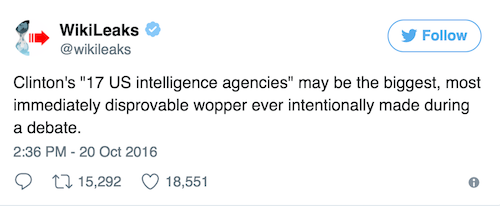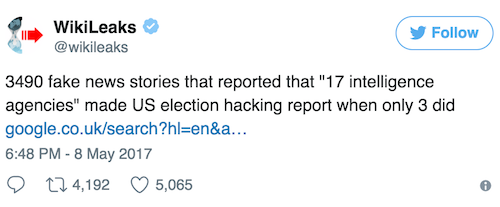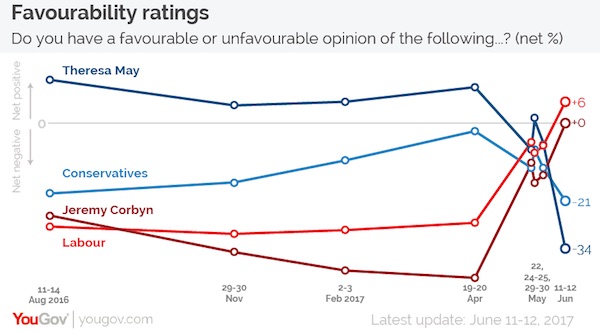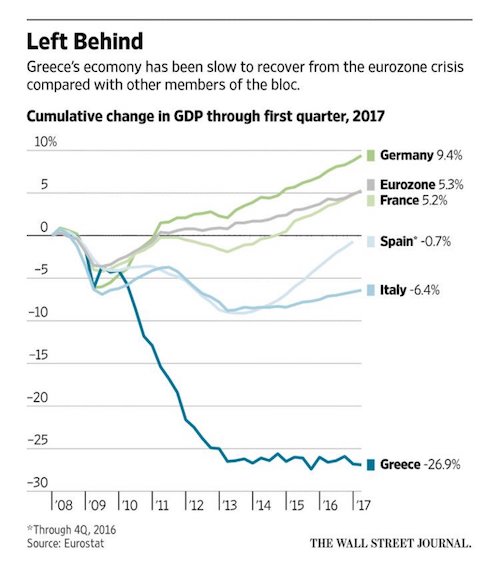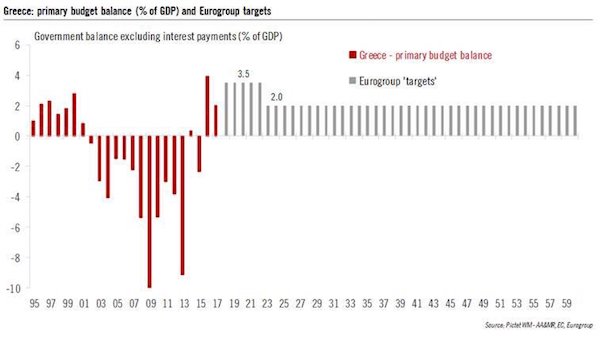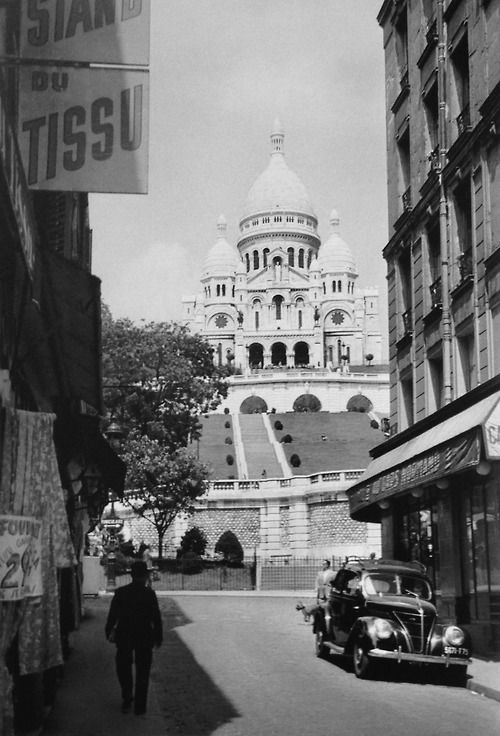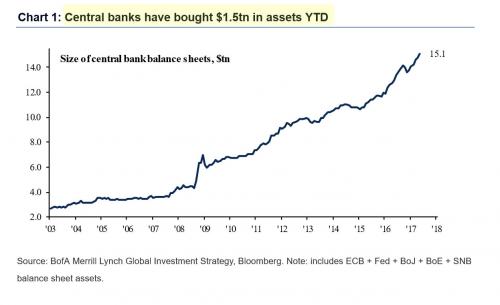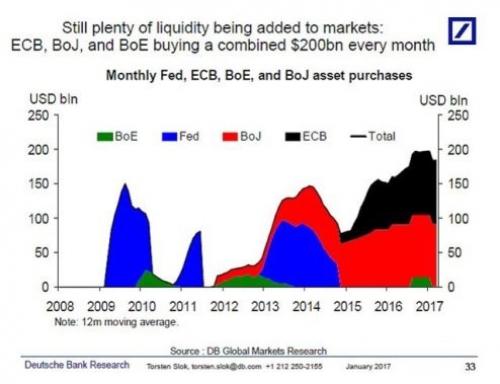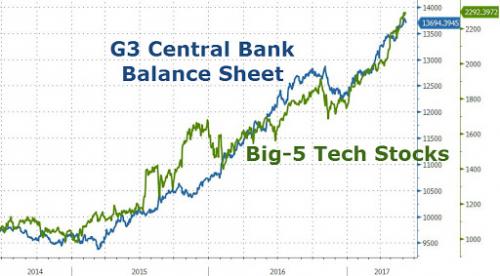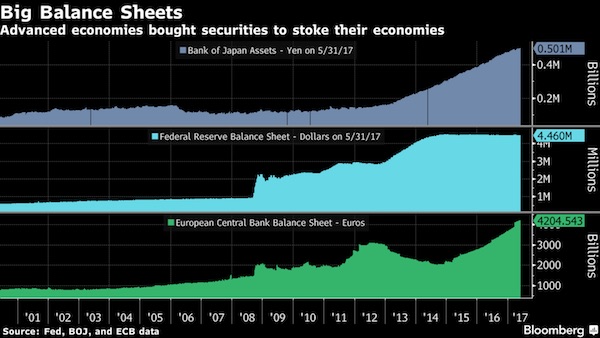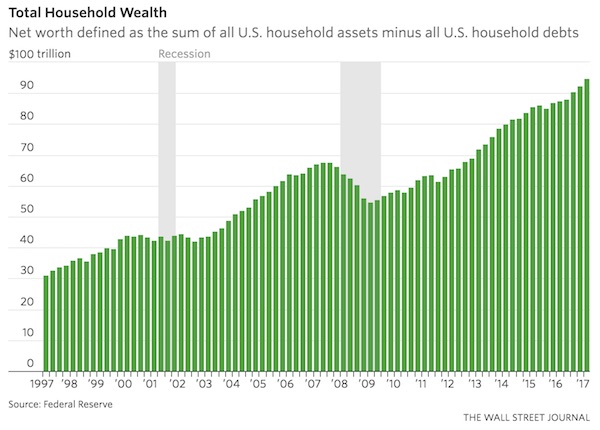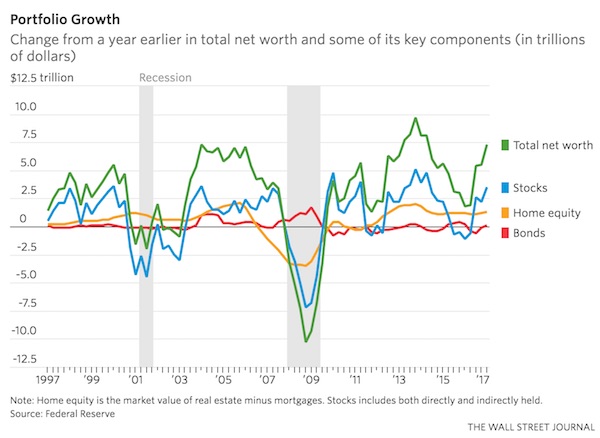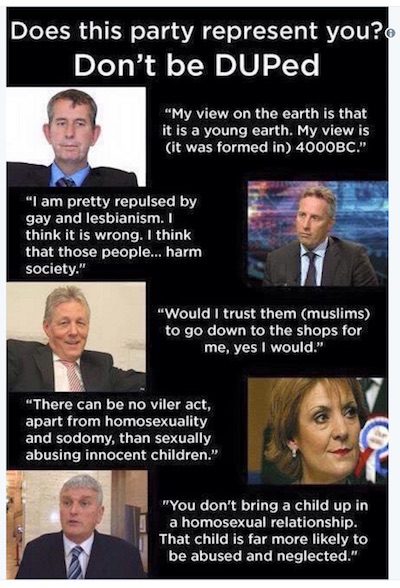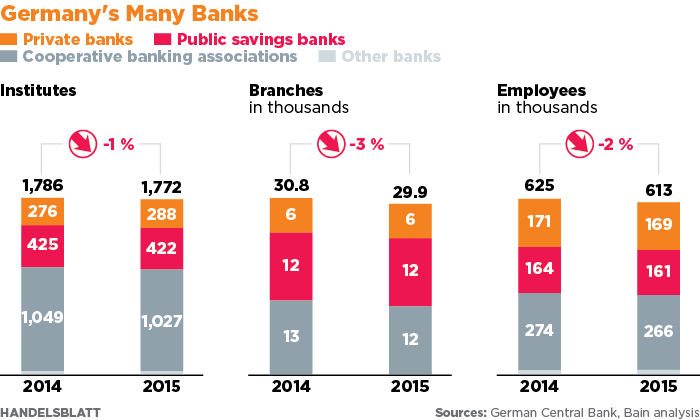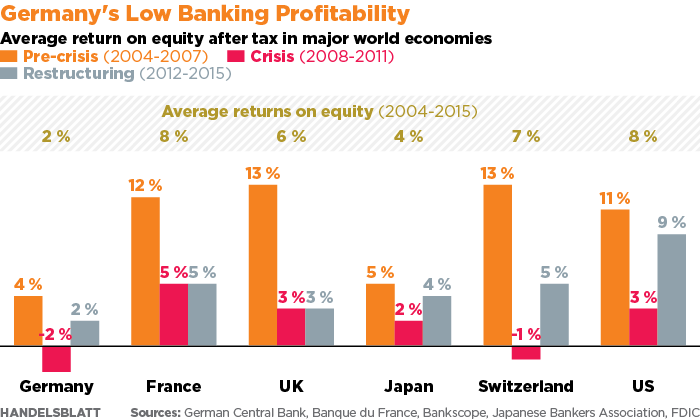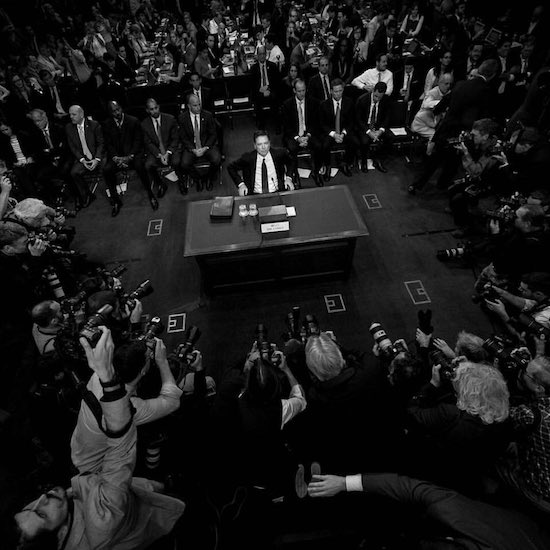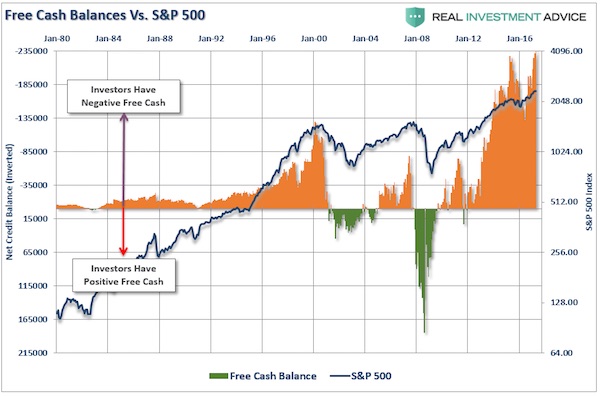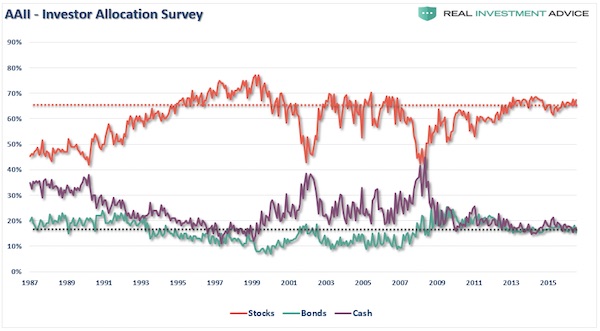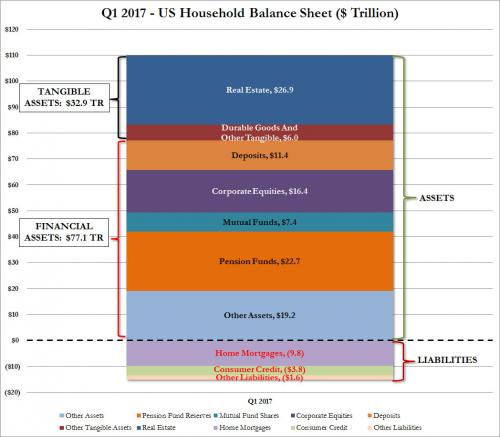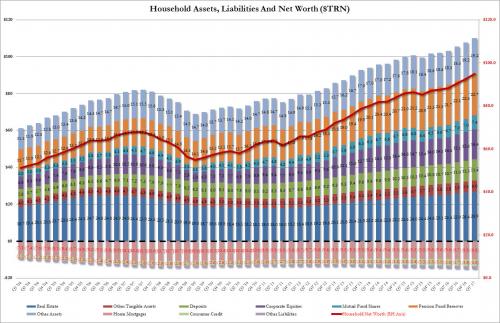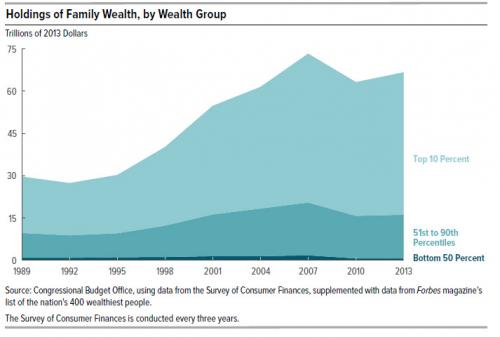
James McNeill Whistler Morning Glories 1869

The illusion of control. Watch the hand.
• A US Recession Ahead? Fed Policymakers Say Not To Worry (R.)
As the gap between short- and long-term borrowing costs hovers near its lowest in more than 10 years, speculation has risen over whether the so-called yield curve is signaling that a recession could be around the corner. Not to worry, two influential Federal Reserve policymakers said on Friday. Another, whose views are typically outside the mainstream at the Fed, disagreed. Growth prospects look pretty strong, which is why the Fed is raising short-term interest rates, the two sanguine policymakers explained. Those rate hikes, they said, are in and of themselves acting to flatten the yield curve. In addition, they argued, the curve will likely steepen as the U.S. government runs a bigger deficit and issues more debt.
The calming comments, from the New York Fed’s incoming chief John Williams and from Chicago Fed President Charles Evans in back-to-back but separate appearances, appeared calculated to allay concern about a potential slowdown ahead. “The yield curve is not nearly as much of a concern as I might have pointed to a couple months ago,” Evans said in Chicago after a speech, in response to a reporter’s question. Williams, who will leave his current job as San Francisco Fed president in June to take over at the New York Fed, also said he expects the Fed’s shrinking balance sheet will help steepen the curve by putting upward pressure on longer-term rates.
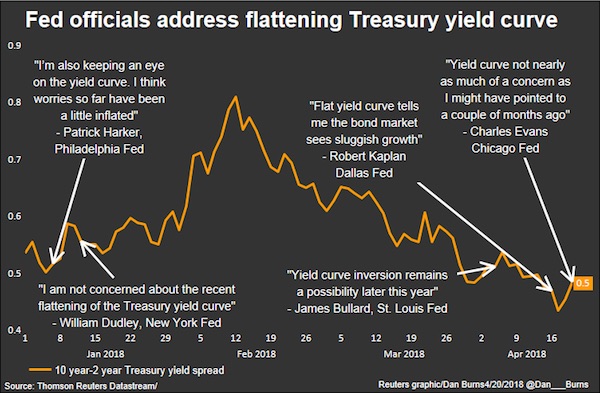
In January the U.S. Congress passed a budget deal that boosts U.S. government spending, following a December tax package that slashes corporate tax rates. Both changes are expected to lead to an increase in government borrowing in coming years. The Fed policymakers reason that a bigger supply of debt should put downward pressure on Treasury prices and deliver a corresponding lift to yields. “We’ve got more fiscal debt in train in the U.S. That has to be funded,” and will likely push up long rates and steepen the yield curve, Evans said. At their March meeting, Fed officials “generally agreed that the current degree of flatness of the yield curve was not unusual by historical standards,” according to the meeting minutes.
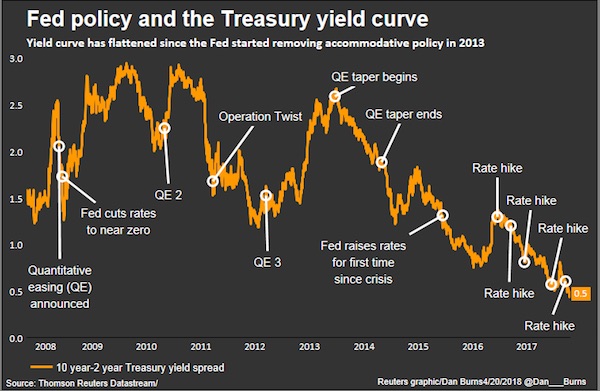

Where the Fed loses control.
• If Treasuries Reach 3%, That Would Be Big (BBG)
The global bond market’s primary benchmark, the 10-year U.S. Treasury yield, is knocking on the door of 3 percent, a level it hasn’t topped in more than four years. That’s more than just a nice round number. Higher yields make the burden of everything from mortgages to student loans and car payments even heavier. Some market gurus see it as a turning point with effects that could be felt for years — and not just in bonds. With the Federal Reserve signaling interest rates are going up even more, investors in riskier assets like stocks and high-yield debt are left to wonder if this is how their post-recession party ends.
1. What’s so important about yield? A bond’s yield is a measure of the return an investor can expect from buying it. It’s determined by the bond’s interest rate and the price paid for it. For instance, buying a security that pays a fixed 2 percent (the “coupon”) at face value (known as “par”) results in a yield of 2 percent. Buying it at a cheaper price would raise the yield for the investor, while paying a premium would reduce the overall yield. (Maybe the most confusing aspect of the bond market to outsiders is the inverse relationship between price and yield.)
2. How do you determine the benchmark 10-year yield?In the $14.9 trillion Treasuries market, the benchmark is based on the most recently auctioned 10-year security (known as the “on-the-run”). It’s the best measure because it tends to have a price close to par and a coupon close to the current yield. On Friday, the 10-year yield closed at 2.96 percent.
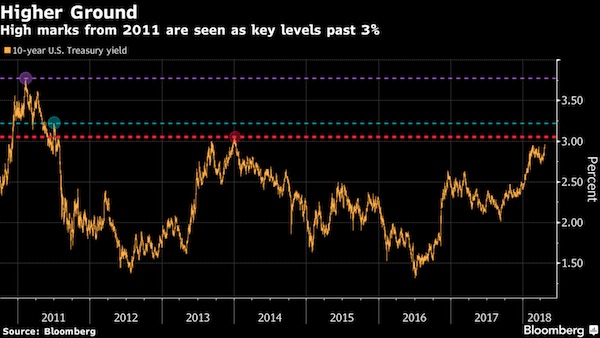
3. Why are yields going up?The Fed is raising its short-term lending rate as the U.S. economy strengthens, after holding it near-zero in the wake of the financial crisis. The three rate hikes last year pushed up two- and five-year Treasury yields in particular, but they’ve also affected 10-year yields as central bankers expect more boosts this year. Another reason: inflation is showing signs of picking up, which erodes the value of bonds’ fixed payments and leads investors to demand higher yields.
4. Why is 3 percent a milestone?Since 2011, it’s been touched only twice, briefly, in 2013 and early 2014, before a bond bull market drove yields to record lows. But 3 percent has also been cited by prominent fixed-income investors like Jeffrey Gundlach at DoubleLine Capital and Scott Minerd at Guggenheim Partners as critical to determining whether the three-decade bull market in bonds is at an end. In the mind of analysts who look at market patterns, once the yield breaks much beyond the 3.05 percent, to levels last reached in 2011, that threshold could flip to a floor from a ceiling.
5. Why does it matter?The 10-year Treasury yield is a global benchmark for borrowing costs. Corporations will have to pay more to issue debt, which they’ve done cheaply in recent years. So will state and local governments, which could jeopardize investments in public infrastructure. Homeowners will face higher mortgage rates (or lose out on refinancing at a lower cost). Taking out loans for cars or college could also become more expensive.

A Nobel Peace Prize.
• Kim Jong-Un Halts Nuclear & Missile Tests, Shuts Down Testing Site (RT)
North Korea’s nuclear and ballistic missile programs have allowed it to secure strategic stability and peace, so there is no need for additional missile and nuclear tests anymore, Kim Jong-un has proclaimed. “From April 21, 2018, nuclear tests and intercontinental ballistic missile tests will be discontinued,” the Korean Central News Agency cited Kim as saying at a plenary meeting of the central committee of the ruling Worker’s Party of Korea (WPK). Furthermore, since North Korea’s nuclear test center has “completed” its mission, it “will be discarded in order to ensure the transparency of the nuclear test suspension,” KCNA reported.
Announcing the new course, the ruling party has declared that North Korea “will never use nuclear weapons, unless there is nuclear threat or nuclear provocation to our country, and in no case we will proliferate nuclear weapons and nuclear technology.” In the announcement, North Korea noted that the “suspension of nuclear testing is an important process for global nuclear disarmament.” Therefore, North Korea is willing to join international denuclearization efforts. North Korea’s last major missile test took place on November 29. Pyongyang announced at the time that it had tested a new type of intercontinental ballistic missile known as the Hwasong-15 that could reach the entire continental United States.
US President Donald Trump, who has traded insults and threats with Kim since taking office, tweeted that the latest decision by Pyongyang is “good news for North Korea and the world,” calling it “big progress.” China has also hailed the move, expressing hope that Pyongyang will continue towards the path of denuclearization and “political settlement” on the Korean Peninsula. “Denuclearization of the peninsula and lasting peace in the region are in line with the common interests of the people of the peninsula,” the Chinese Foreign Ministry said in a statement on Saturday.

Have they really thought this through?
• DNC Sues Russia, Trump, Wikileaks For Conspiring To Hurt Hillary in 2016 (ZH)
Did The Democrats’ “The Russians did it” narrative just jump the shark? The Washingtoin Post reports that The Democratic National Committee filed a multimillion-dollar lawsuit Friday against the Russian government, the Trump campaign and the WikiLeaks organization alleging a far-reaching conspiracy to disrupt the 2016 campaign and tilt the election to Donald Trump. The lawsuit alleges that in addition to the Russian Federation, the General Staff of the Armed Forces of the Russian Federation, Wikileaks and Guccifer 2.0, top Trump campaign officials, including Donald Trump Jr, Roger Stone, Jared Kushner, Paul Manafort and pretty much everyone else who has been mentioned in the same paragraph as Trump….
… conspired with the Russian government and its military spy agency to hurt Democratic presidential nominee Hillary Clinton and help Trump by hacking the computer networks of the Democratic Party and disseminating stolen material found there. [..] The suit filed today seeks millions of dollars in compensation to offset damage it claims the party suffered from the hacks. The DNC argues that the cyberattack undermined its ability to communicate with voters, collect donations and operate effectively as its employees faced personal harassment and, in some cases, death threats.
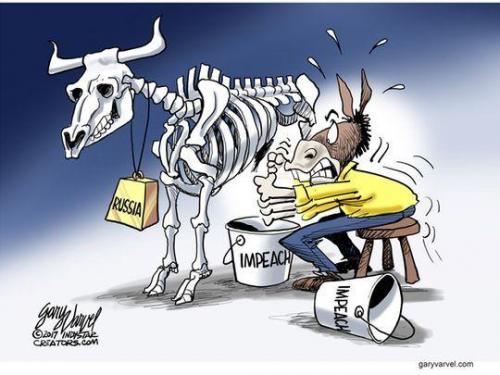

And Julian Assange is not allowed to see this. Let alone defend himself. A pattern in his life.
• DNC Lawsuit Against WikiLeaks a Serious Threat to Press Freedom (IC)
The Democratic National Committee (DNC) filed a lawsuit this afternoon in a Manhattan federal court against the Russian Government, the Trump campaign and various individuals it alleges participated in the plot to hack its email servers and disseminate the contents as part of the 2016 election. The DNC also sued WikiLeaks for its role in publishing the hacked materials, though it does not allege that WikiLeaks participated in the hacking or even knew in advance about it; its sole role, according to the DNC’s lawsuit, was publishing the hacked emails.
The DNC’s suit, as it pertains to WikiLeaks, poses a grave threat to press freedom. The theory of the suit – that WikiLeaks is liable for damages it caused when it “willfully and intentionally disclosed” the DNC’s communications (paragraph 183) – would mean that any media outlet that publishes misappropriated documents or emails (exactly what media outlets quite often do) could be sued by the entity or person about which they are reporting, or even theoretically prosecuted for it, or that any media outlet releasing an internal campaign memo is guilty of “economic espionage” (paragraph 170).
It is extremely common for media outlets to publish or report on materials that are stolen, hacked, or otherwise obtained in violation of the law. In October, 2016 – one month before the election – someone mailed a copy of Donald Trump’s 1995 tax returns to the New York Times, which published parts of it even though it is illegal to disclose someone’s tax returns without the taxpayer’s permission; in March, 2017, MSNBC’s Rachel Maddow did the same thing with Trump’s 2005 tax returns.
In April, 2016, the Washington Post obtained and published a confidential internal memo from the Trump campaign. Media outlets constantly publish private companies’ internal documents. Just three weeks ago, BuzzFeed obtained and published a secret Facebook memo outlining the company’s internal business strategies, the contents of which were covered by most major media outlets. Some of the most important stories in contemporary journalism have come from media outlets obtaining and publishing materials that were taken without authorization or even in violation of the law. Both the New York Times and Washington Post published thousands of pages from the top secret Pentagon Papers after Daniel Ellsberg took them without authorization from the Pentagon – and they won the right to publish them in the U.S. Supreme Court.
The Guardian and the Washington Post won the 2014 Pulitzer Prize for Public Service for publishing and reporting on huge numbers of top secret documents taken by Edward Snowden from the NSA. The Guardian, the New York Times, and numerous papers from around the world broke multiple stories by publishing classified classified documents downloaded by Chelsea Manning without authorization and sent to WikiLeaks. In 2016, more than 100 newspapers from around the world published and reported on millions of private financial documents known as the “Panama Papers,” which were taken without authorization from one of the world’s biggest offshore law firms and revealed the personal finances of people around the world.

Did the DNC see this coming, and is that why they sued first?
• Trump To “Counter” DNC Lawsuit (ZH)
President Trump is eager to go head-to-head with the DNC which filed a multimillion-dollar lawsuit on Friday against several parties, including the Russian government, the Trump campaign and the WikiLeaks organization – alleging a “far-reaching conspiracy to disrupt the 2016 campaign and tilt the election to Donald Trump.” Hours after the Washington Post broke the news of the lawsuit, Trump tweeted “Just heard the Campaign was sued by the Obstructionist Democrats. This can be good news in that we will now counter for the DNC server that they refused to give to the FBI,” referring to the DNC email breach. Trump also mentioned “the Debbie Wasserman Schultz Servers and Documents held by the Pakistani mystery man and Clinton Emails.”
The “Pakistani mystery man” is a clear reference to former DNC CHair Debbie Wasserman Schultz’s longtime IT employee and personal friend, Imran Awan – whose father, claims a Daily Caller source, transferred a USB drive to the former head of a Pakistani intelligence agency – Rehman Malik. Malik denies the charge. Of note, the DNC would not allow the FBI to inspect their servers which were supposedly hacked by the Russians – instead relying on private security firm Crowdstrike. Meanwhile, the “Wasserman Schultz Servers” Trump mentions is likely in reference to the stolen House Democratic Caucus server – which Imran Awan had been funneling information onto when it disappeared shortly after the House Inspector General concluded that the server may have been “used for nefarious purposes.”
Imran Awan, his wife Hina Alvi and several other associates ran IT operations for at least 60 Congressional Democrats over the past decade, along with the House Democratic Caucus – giving them access to emails and computer data from around 800 lawmakers and staffers – including the highly classified materials reviewed by the House Intelligence Committee.
Napolitano: He was arrested for some financial crime – that’s the tip of the iceberg. The real allegation against him is that he had access to the emails of every member of congress and he sold what he found in there. What did he sell, and to whom did he sell it? That’s what the FBI wants to know. This may be a very, very serious national security situation.

“..all of Comey’s memos – all of them, were classified at the time they were written, and they remain classified.”
• Comey Memos Probed By DOJ For Classified Info Leaks (ZH)
The Department of Justice (DOJ) inspector general is now conducting an investigation into classification issues concerning the “Comey memos” leaked to the New York Times by former FBI Director James Comey. Sources tell the Wall St. Journal that at least two of the memos which Comey leaked to his “good friend,” Columbia Law Professor Daniel Richman, contained information that officials now consider classified – prompting the review by the Office of the Inspector General, headed by Michael Horowitz. “Of those two memos, Mr. Comey himself redacted elements of one that he knew to be classified to protect secrets before he handed the documents over to his friend. He determined at the time that another memo contained no classified information, but after he left the Federal Bureau of Investigation, bureau officials upgraded it to “confidential,” the lowest level of classification.” -WSJ
Comey told Congressional investigators that he considered the memos to be personal rather than government documents. The memos – leaked through Richman, were a major catalyst in Deputy Attorney General Rod Rosenstein’s decision to appoint former FBI Director Robert Mueller as special counsel to investigate Russian interference in the 2016 US election. While Richman told CNN “No memo was given to me that was marked ‘classified,’ and James Comey told Congressional investigators he tried to “write it in such a way that I don’t include anything that would trigger a classification,” it appears the FBI’s chief FOIA officer disagrees.
We previously reported that Senator Chuck Grassley (R-IA) said four of the 7 Comey memos he reviewed were “marked classified” at the “Secret” or “Confidential” level – however in January the FBI’s chief FOIA officer reportedly told Judicial Watch – in a signed declaration, that every single Comey memo was classified at the time. “We have a sworn declaration from David Hardy who is the chief FOIA officer of the FBI that we obtained just in the last few days, and in that sworn declaration, Mr. Hardy says that all of Comey’s memos – all of them, were classified at the time they were written, and they remain classified.” -Chris Farrell, Judicial Watch
Therefore, Farrell points out, Comey mishandled national defense information when he “knowingly and willfully” leaked them to his friend at Columbia University. It’s also mishandling of national defense information, which is a crime. So it’s clear that Mr. Comey not only authored those documents, but then knowingly and willfully leaked them to persons unauthorized, which is in and of itself a national security crime. Mr. Comey should have been read his rights back on June 8th when he testified before the Senate. Farrell told Lou Dobbs “Recently retired and active duty FBI agents have told me – and it’s several of them, they consider Comey to be a dirty cop.”

“Wells Fargo fined twenty days worth of net income sounds a lot less daunting than $1 billion..”
• Wells Fargo’s $1 Billion Pact Gives U.S. Power to Fire Managers (BBG)
Wells Fargo’s $1 billion fine won’t close the book on fallout from its consumer scandals. The nation’s third-largest bank submitted to an unprecedented order Friday that would give the Office of the Comptroller of the Currency the right to remove some of the lender’s executives or board members. That comes on top of the penalties Wells Fargo will pay to settle U.S. probes into mistreatment of consumers, the largest sanction of a U.S. bank under President Donald Trump. The OCC said it “reserves the right to take additional supervisory action, including imposing business restrictions and making changes to executive officers or members of the bank’s board of directors.” The agency could also veto potential executive candidates.
The bank will pay $500 million in penalties each to the OCC and the Consumer Financial Protection Bureau, according to a statement Friday. Wells Fargo warned shareholders last week it would soon face a fine of that size, which it will book retroactively in the first quarter. The bank remains under a Federal Reserve penalty that bans growth in total assets. “CEOs who hoped the Trump administration would be universally lenient regulators missed the difference between a dislike for rules that stifle innovation and employment and a dislike for rules against wrongdoing,” said Erik Gordon, a professor at the University of Michigan’s Ross School of Business.

Squeezing that stone for all he’s worth.
• IMF’s Thomsen Proposes Broadening Greek Tax Base (K.)
Poul Thomsen, director of the International Monetary Fund’s European department, on Friday spoke in favor of broadening Greece’s tax base though he stopped short of determining whether the IMF would call for reductions to the tax-free threshold (due to come into effect in January 2020) to apply a year in advance. Speaking in Washington, where the IMF is holding its Spring Meetings, Thomsen said that raising taxes had played a large part in the country’s fiscal adjustment in recent years but that Greece must find a way of meeting fiscal targets that is “growth-friendly.” The IMF will not impose any specific policies, he said but proposed a “discussion” about the timing of tax reforms.
As regards the Fund’s potential role in Greece’s third international bailout, which expires in August, he said at least one bailout review must be carried out before a decision can be made as well as agreement to lighten Greece’s debt. “Time is running short for us to be able to activate the program,” he said. A discussion on debt measures is likely to take place at the next meeting of eurozone finance ministers, scheduled for April 27 in Sofia. Talks there will also focus on a growth plan that the government has presented to bailout auditors. Finance Minister Euclid Tsakalotos on Friday met in Washington with European Economic and Monetary Affairs Commissioner Pierre Moscovici, Eurogroup Chairman Mario Centeno and European Central Bank President Mario Draghi and is to meet Thomsen and IMF chief Christine Lagarde on Saturday.

If this doesn’t bring down the government, Britain has a whale of a problem. And no excuses. May suddenly offering them money now, after being exposed, is perhaps the worst part of it. You can’t buy off blatant racism with taxpayer money. And those taxpayers should let that be known, very loudly. Or they’re just as guilty.
• Windrush: When Even Legal Residents Face Deportation (Atlantic)
In the aftermath of World War II, the British government invited thousands of people from Caribbean countries in the British Commonwealth to immigrate to the United Kingdom and help address the war-torn country’s labor shortages. Now, nearly 70 years later, many of those same people, now elderly, are having their legal status in the country questioned and are facing deportation. Though the deportation threats date as far back as October, the crisis burst into wider view this week after Caribbean diplomats representing a dozen Commonwealth nations chastised the U.K. government publicly. “This is about people saying, as they said 70 years ago, ‘Go back home.’ It is not good enough for people who gave their lives to this country to be treated like this,” Guy Hewitt, the high commissioner from Barbados to the U.K., said at a gathering of the diplomats.
The migrants are known as the “Windrush generation,” named for the HMT Empire Windrush that brought the first group of them to the U.K. in June 1948. Of the half a million people who immigrated to the U.K. from the Commonwealth between then and 1971, an estimated 50,000 lack the proper documentation to prove it. In a meeting with Caribbean leaders on Tuesday, U.K. Prime Minister Theresa May apologized “for any anxiety that has been caused” and promised no deportations would take place. Still, such assurances won’t necessarily convince those who remain skeptical of the U.K.’s strict immigration policies—ones May herself championed when she served as home secretary between 2010 and 2016.
During that time, May sought to meet then-Prime Minister David Cameron’s goal of reducing net immigration to the tens of thousands by making the U.K. a “hostile environment” for illegal immigration. In practice, this meant requiring doctors, employers, landlords, and schools to confirm that those whom they served were in the country legally. “The determination was to go systematically through any interaction people might have with the state, short of putting checkpoints in the road, just to have people’s immigration status checked,” Polly Mackenzie, the director of cross-party think tank Demos and the former policy director to Deputy Prime Minister Nick Clegg, told me. The Windrush generation wasn’t supposed to be part of that calculus—they had immigrated to the country legally and were thereby entitled to public services, including the right to education, healthcare, and social security.
But after the implementation of the “hostile environment” policies in 2012, these individuals suddenly had to prove their right to live and work in the country—a right which was guaranteed to them under the Immigration Act of 1971, though not everyone obtained the documentation to confirm it. This documentation problem arose in part from the fact that so many people belonging to the Windrush generation immigrated to the U.K. as children, often on their parents’ passport. What’s more, the British government didn’t keep records of who was permitted to stay in the country, nor did they issue documentation confirming it. What little records the government did keep, such as the landing cards documenting the arrival dates of Windrush-era immigrants, were discarded in 2010.
For some, the result was catastrophic. In one case, a woman had lived and worked in the U.K. for 50 years before she was wrongfully declared an illegal immigrant and almost forced on a plane to her native Jamaica. In another, a man who had lived in the U.K. for 59 years received a letter that not only informed him of his illegal status in the country, but also offered him “help and support on returning home voluntarily.” Perhaps one of the most severe cases concerned a man who, after living in the U.K. for 44 years, had his cancer treatment through the National Health Service withheld because he couldn’t provide sufficient documentation to prove he lived in the country continuously since immigrating from Jamaica in 1973.



